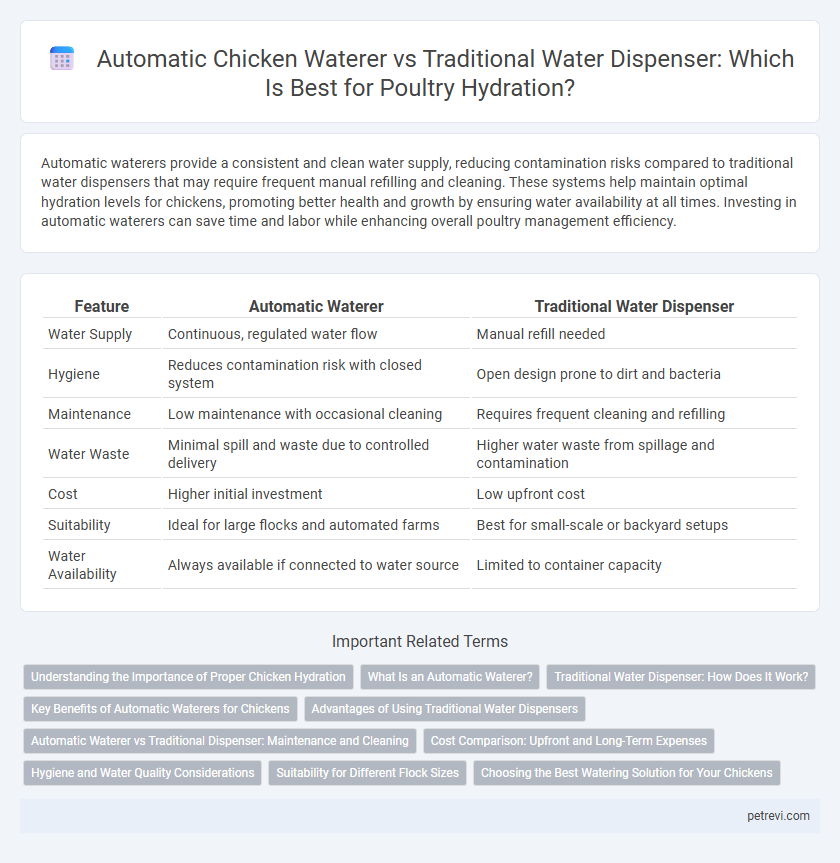Automatic waterers provide a consistent and clean water supply, reducing contamination risks compared to traditional water dispensers that may require frequent manual refilling and cleaning. These systems help maintain optimal hydration levels for chickens, promoting better health and growth by ensuring water availability at all times. Investing in automatic waterers can save time and labor while enhancing overall poultry management efficiency.
Table of Comparison
| Feature | Automatic Waterer | Traditional Water Dispenser |
|---|---|---|
| Water Supply | Continuous, regulated water flow | Manual refill needed |
| Hygiene | Reduces contamination risk with closed system | Open design prone to dirt and bacteria |
| Maintenance | Low maintenance with occasional cleaning | Requires frequent cleaning and refilling |
| Water Waste | Minimal spill and waste due to controlled delivery | Higher water waste from spillage and contamination |
| Cost | Higher initial investment | Low upfront cost |
| Suitability | Ideal for large flocks and automated farms | Best for small-scale or backyard setups |
| Water Availability | Always available if connected to water source | Limited to container capacity |
Understanding the Importance of Proper Chicken Hydration
Proper chicken hydration is crucial for maintaining optimal health, growth, and egg production in poultry. Automatic waterers provide consistent, clean water access that reduces contamination and water spillage compared to traditional water dispensers, which may require frequent manual refilling. Ensuring chickens receive adequate hydration through efficient watering systems supports immune function and prevents dehydration-related stress.
What Is an Automatic Waterer?
An automatic waterer for chickens is a self-regulating device that provides a continuous supply of fresh water by refilling itself as birds drink, reducing water spillage and contamination. Unlike traditional water dispensers, which require frequent manual refilling and cleaning, automatic waterers use mechanisms such as float valves or gravity-fed systems to maintain optimal hydration levels effortlessly. This technology enhances poultry health by ensuring consistent access to clean water, minimizing labor, and improving overall flock management efficiency.
Traditional Water Dispenser: How Does It Work?
Traditional water dispensers for chickens operate using gravity to provide a continuous flow of water into a trough or container. Chickens drink from the accessible water surface, while the reservoir replenishes the supply as water levels drop. This simple mechanism requires regular cleaning and refilling to ensure fresh, uncontaminated water for optimal poultry hydration.
Key Benefits of Automatic Waterers for Chickens
Automatic waterers for chickens provide consistent and clean water supply, reducing contamination risks compared to traditional water dispensers. They help maintain optimal hydration levels by automatically refilling, which supports better health and egg production in poultry. Installation of automatic waterers minimizes labor and water waste, enhancing farm efficiency and sustainability.
Advantages of Using Traditional Water Dispensers
Traditional water dispensers for chicken hydration offer simplicity and reliability with minimal maintenance requirements, ensuring consistent water availability even during power outages. Their cost-effectiveness and ease of cleaning reduce the risk of bacterial buildup, promoting better health and hygiene for poultry. The design typically prevents spillage and water wastage, contributing to a cleaner coop environment and optimal water usage.
Automatic Waterer vs Traditional Dispenser: Maintenance and Cleaning
Automatic waterers for chickens offer reduced cleaning frequency due to their closed system design that minimizes contamination and algae growth, enhancing water hygiene. Traditional water dispensers require daily maintenance to prevent buildup of dirt, debris, and bacteria, which can affect chicken health and water quality. Choosing an automatic waterer improves long-term sanitation while lowering labor efforts in maintaining clean hydration sources for poultry.
Cost Comparison: Upfront and Long-Term Expenses
Automatic waterers for chicken hydration typically involve higher upfront costs due to installation and equipment expenses, ranging from $50 to $150 per unit, while traditional water dispensers are much cheaper initially, often under $20. Over time, automatic waterers reduce labor and water waste, resulting in lower maintenance and operational expenses, which can save poultry farmers significant amounts annually compared to frequent refills and cleaning required for traditional dispensers. Considering long-term expenses, automatic systems provide better value through durability and efficiency despite the initial investment.
Hygiene and Water Quality Considerations
Automatic waterers for chickens significantly enhance hygiene by providing a continuous, clean water supply that reduces contamination risks compared to traditional water dispensers, which often accumulate dirt and bacteria. The closed system of automatic waterers minimizes exposure to debris, preventing the growth of harmful microbes and ensuring higher water quality. Traditional dispensers require frequent cleaning to maintain safe hydration, whereas automatic waterers maintain consistent water freshness with less manual intervention.
Suitability for Different Flock Sizes
Automatic waterers provide a continuous and easily accessible water supply ideal for large chicken flocks, significantly reducing water wastage and labor. Traditional water dispensers suit smaller flocks by offering simplicity and lower initial costs, though they require frequent manual refilling and cleaning. Choosing the right system depends on flock size, with automatic waterers enhancing efficiency in commercial or large-scale poultry farms and traditional dispensers fitting backyard or small-scale operations.
Choosing the Best Watering Solution for Your Chickens
Automatic waterers provide a consistent, clean water supply that reduces contamination risks compared to traditional water dispensers, promoting better chicken health and growth. Traditional water dispensers are cost-effective and easy to maintain but require frequent refilling and cleaning to prevent bacterial buildup. Selecting the best watering solution depends on flock size, budget, and management style to ensure optimal chicken hydration and welfare.
Automatic Waterer vs Traditional Water Dispenser for Chicken Hydration Infographic

 petrevi.com
petrevi.com